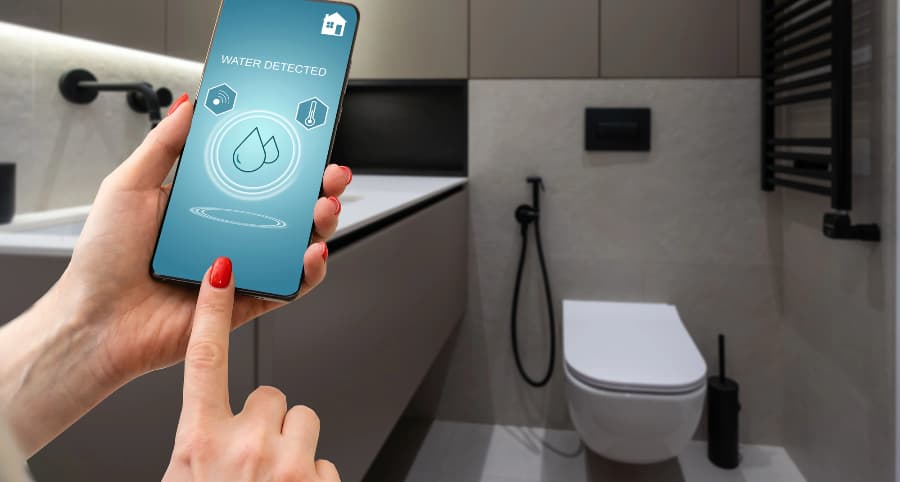How does a water sensor work and why install one with your Baltimore smart home?

One small leak in your home can result in significant problems and thousands in damage. You need to safeguard against this risk; fortunately, there’s a simple way to accomplish this. A water sensor is a simple, effective, and affordable solution. Learn how they work and why you ought to integrate water sensors into your Baltimore smart home.
How water sensors shield Baltimore your home
Water penetrates homes in many ways, whether from a plumbing issue, storm-related incident, appliance snafu, or simple human error. No matter how it occurs, you must know at once, and this is why water sensors are important. But how exactly do they work?
Many water sensors are conductive and operate with corresponding electrodes. When water infiltrates the space between the electrodes, an electrical circuit is created, setting off your alarm. You’ll also come across capacitive sensors that release an electrical field. Your alarm activates when water reaches the conductive parts of these components and disrupts the field. Optical sensors employing infrared LED light are another option.
Get more from your water sensor
A few innovative water sensors give you even more peace of mind as they feature integrated temperature sensors. This is a smart way to prevent frozen pipes. If there’s an extreme drop in temperature, you’ll be notified right away. Taking action before pipes break will protect you from flooding and expensive repairs.
Why integrate water sensors into your Baltimore smart home?
When water emergencies arise, you have to be notified immediately. You can reach this objective by incorporating water sensors into your smart home. Whether you’re on site to hear the alarm or somewhere else, you’ll get an instant notification on your mobile device. In addition, your 24-hour monitoring agents will be alerted. Every moment counts in a water emergency to control the damage and interruption to your life.
Where should you place water sensors?
Any area prone to an influx of water is a suitable place for water sensors. Think about installing in these spots:
- Bathrooms: Attach behind toilets or close to tubs.
- Basements: Water commonly infiltrates basements through leaky walls or as a result of excess rain or broken sump pumps.
- Around water heaters or appliances: Any water-using appliance could leak over time.
- Below sinks: Water sensors are great for detecting pipe leaks in areas not easy to see.
- Attics: Identify roof leaks quickly and avert costly damage.
Get water sensors with your Vivint smart home
Give your property the robust protection it requires with modern components from Vivint. Our water sensors in Baltimore link to your Vivint cell phone app to send you instant alerts when your alarm goes off. You also benefit from integrated temperature sensors to avoid pipe freezing. Learn more about the smart home devices available in Baltimore by dialing (410) 231-7697 today.